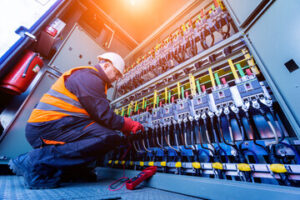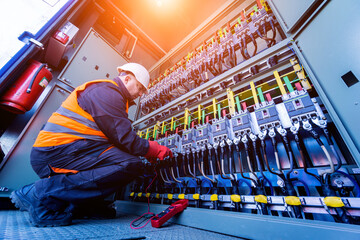Hiring Electrician Midland MI is essential for ensuring the safety and functionality of any electrical system. Electrical work involves more than just installing wires and connecting circuits; it requires a deep understanding of electrical codes, safety regulations, and the proper use of tools and materials.
Professional electricians play a critical role in maintaining residential, commercial, and industrial electrical systems, ensuring that they operate efficiently and safely. Without proper expertise, electrical issues can lead to serious consequences such as power outages, equipment failure, fire hazards, and even personal injury. Relying on a trained and licensed electrician helps prevent these risks and ensures that electrical systems are installed and maintained according to the highest standards.
Electricians are trained to handle a wide range of electrical tasks, from installing lighting fixtures and wiring systems to troubleshooting complex electrical issues. Their work begins with a thorough assessment of the electrical system, identifying potential risks and determining the most effective solutions. This requires knowledge of electrical codes and safety regulations to ensure compliance and reduce the likelihood of accidents. Proper installation of wiring, outlets, switches, and circuit breakers is critical for ensuring that the electrical system functions reliably and safely. Electricians also test and inspect electrical systems to identify any weaknesses or faults that could lead to malfunctions or safety hazards.
Electrical problems often stem from outdated or faulty wiring. Over time, wiring can degrade due to exposure to heat, moisture, and wear, increasing the risk of short circuits and electrical fires. Electricians are skilled at replacing old wiring and upgrading electrical panels to handle modern electrical loads. This involves carefully removing old wiring, installing new conduits, and connecting circuits to meet current safety standards. Upgrading electrical systems not only improves safety but also enhances the efficiency and capacity of the system, allowing it to support new appliances and technological advancements. Electricians also install and repair grounding systems, which are essential for protecting equipment and preventing electrical shocks.
Lighting installation and repair is another key area where electricians provide valuable expertise. Proper lighting enhances the functionality and atmosphere of a space while reducing energy consumption. Electricians can install various types of lighting, including recessed lighting, track lighting, and energy-efficient LED fixtures. They ensure that lighting systems are properly wired and configured to provide consistent illumination without overloading circuits. Troubleshooting lighting issues, such as flickering lights or faulty switches, requires an understanding of circuit loads and electrical flow. Electricians can also install dimmer switches and smart lighting systems, giving users greater control over lighting intensity and energy usage.
Electrical panel upgrades are often necessary to support the increasing demand for power in modern homes and businesses. Older electrical panels may not have the capacity to handle the number of appliances and devices used today, leading to frequent tripped breakers and power surges. Upgrading an electrical panel involves replacing outdated breakers, increasing the panel’s capacity, and ensuring that it is properly grounded. Electricians also inspect and repair circuit breakers that fail to trip properly, which can prevent overheating and reduce the risk of electrical fires. Ensuring that the electrical panel is properly configured and balanced helps maintain a stable and reliable electrical supply.
Electricians are also responsible for installing and maintaining outlets and switches. Faulty outlets and switches can cause power interruptions and increase the risk of electrical shock. Electricians test and replace damaged outlets, ensuring that they are properly grounded and that the wiring connections are secure. Installing new outlets and switches requires careful planning to avoid overloading circuits and to provide adequate power distribution. Ground-fault circuit interrupters (GFCIs) and arc-fault circuit interrupters (AFCIs) are often installed to improve safety and reduce the risk of electrical fires. These devices detect faults in the electrical system and shut off power to prevent damage and injury.
Electrical inspections are critical for identifying potential hazards and ensuring that an electrical system meets safety standards. Electricians conduct comprehensive inspections of wiring, panels, outlets, and fixtures, looking for signs of wear, corrosion, and improper installation. Identifying and correcting these issues prevents future problems and ensures that the electrical system operates efficiently. Electrical inspections are especially important during renovations, after major storms, or when purchasing a new property. Electricians provide detailed reports and recommendations for any necessary repairs or upgrades to bring the system up to code and improve its overall performance.
Emergency electrical repairs require quick and accurate diagnosis to restore power and prevent further damage. Power outages, electrical shocks, and burning smells are signs of serious electrical problems that require immediate attention. Electricians respond to emergency calls, locating the source of the problem and implementing effective solutions. This may involve repairing damaged wiring, replacing faulty breakers, or installing new grounding systems. Rapid response and expert repair work prevent property damage and ensure the safety of the occupants. Electricians also provide guidance on how to prevent future electrical issues and improve system resilience.
Electricians play a key role in the installation and maintenance of backup power systems, such as generators and battery storage units. Backup power systems provide critical support during power outages, ensuring that essential systems such as heating, cooling, and medical equipment remain operational. Installing a backup power system requires careful planning to integrate it with the existing electrical system and ensure that it activates automatically during an outage. Electricians test and maintain these systems to ensure they function reliably when needed. Regular maintenance includes checking fuel levels, testing battery capacity, and inspecting transfer switches.
Smart home technology has increased the demand for skilled electricians who can install and integrate automated systems. Smart lighting, thermostats, security systems, and voice-controlled devices rely on a stable and properly configured electrical network. Electricians install and program smart home systems, ensuring that they communicate effectively with the electrical infrastructure. This includes setting up Wi-Fi-enabled switches, configuring smart panels, and installing power-saving devices. Electricians also provide troubleshooting and support to resolve connectivity issues and improve system performance. A properly installed smart home system enhances convenience, security, and energy efficiency.
Industrial and commercial electrical work requires specialized knowledge and experience. Large-scale electrical systems must support high-voltage equipment, complex machinery, and automated systems. Electricians working in industrial and commercial settings install and maintain electrical panels, transformers, and circuit protection devices. They also design and implement energy-efficient solutions to reduce operating costs and improve system reliability. Troubleshooting industrial electrical problems requires advanced diagnostic tools and an understanding of complex electrical networks. Electricians ensure that commercial and industrial systems meet safety standards and operate efficiently to support business operations.
Safety is a top priority for electricians, and they are trained to follow strict safety protocols to prevent accidents and injuries. Working with electricity involves the risk of electrical shock, burns, and falls. Electricians use protective equipment such as insulated gloves, safety harnesses, and face shields to minimize these risks. They also follow lockout and tagout procedures to prevent accidental energization of circuits during repairs. Ensuring that all work complies with safety codes and regulations protects both the electrician and the property owner. Proper training and adherence to safety protocols reduce the risk of accidents and improve the overall quality of electrical work.
Ongoing training and certification are essential for electricians to stay updated on new technologies, codes, and best practices. Electrical systems are constantly evolving with the development of energy-efficient devices, renewable energy solutions, and smart technology. Electricians participate in continuing education programs to maintain their licenses and improve their skills. This includes training on new installation techniques, diagnostic tools, and safety standards. Keeping up with industry advancements ensures that electricians can provide high-quality service and recommend the best solutions for their clients. Professional certification and licensing demonstrate an electrician’s expertise and commitment to excellence.
Professional electricians provide essential services that ensure the safety, functionality, and efficiency of electrical systems. Their expertise covers a wide range of tasks, from installing and repairing wiring to upgrading panels and integrating smart technology. Skilled electricians diagnose and resolve electrical problems quickly and accurately, preventing further damage and improving system performance. Investing in professional electrical services enhances the value and safety of a property, reduces energy costs, and ensures reliable operation. Relying on a trained and certified electrician provides peace of mind and long-term benefits for both residential and commercial properties.
